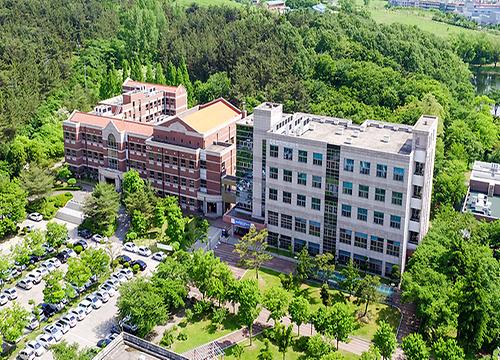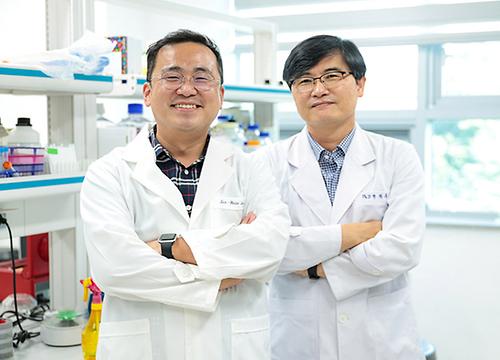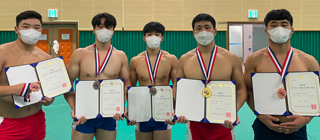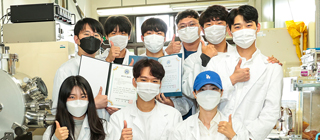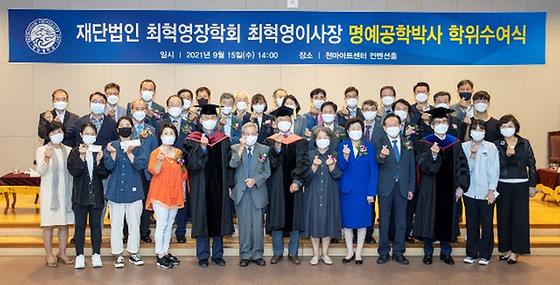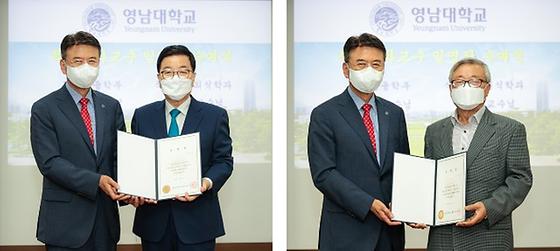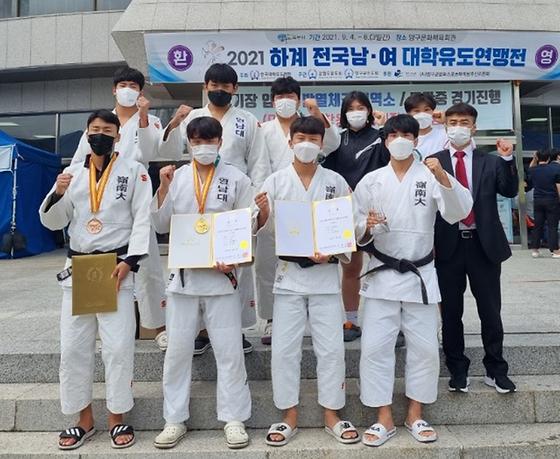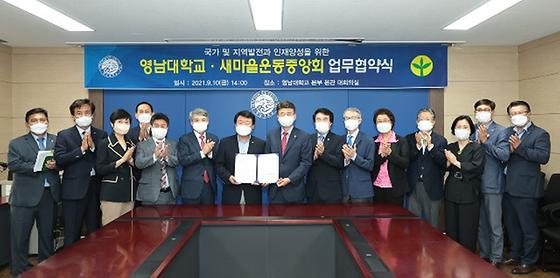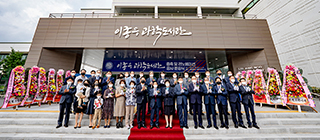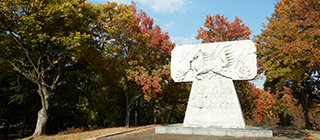-
Placed first last year and second this year in ‘bar exam passing rate’ Took first and second place for the past 3 years to, solidifying its status as a prestigious law school Virtuous cycle structure of ‘nation’s top performance→admissions of outstanding students→fostering excellent legal professionals [October 7, 2021]] <Panoramic view of the YU Law School> YU (President CHOI Oe-chool) Law School recorded an admissions competition rate of 10.5 to 1 for the 2022 school year, thus being a slight increase from last year that was 8.6 to 1. Upon closing registration for admissions on October 1, 738 applied for the quota of 70 new students, thus recording the second highest competition rate in the nation. The average competition rate for law schools is 5.2 to 1. It was analyzed that the reason for the high competition rate was because the YU Law school achieved good accomplishments for about 10 years since it was opened, thus drawing attention of law school applicants. In particular, the passing rate for the bar exam by the YU Law School is unparalleled. YU Law School took second place in the 10th bar examinations in terms of national passing rates (for 10th Law School class). It has been ranking first and second place in the national bar exam passing rate over the past three years ranking second for the 8th bar exam and 1st in the 9th bar exam (based on the 9th admitted class), solidifying its status as a prestigious law school of Korea. YU’s high rate in earning master’s degrees is also attracting attention. When basing on all students admitted to the law school up to now from the 1st to 10th classes, YU has a huge master’s degree earning rate at 92.9% (719 students admitted/668 graduated). This is third place following Seoul National University Law School and Korea University Law School. YU Law School Dean Lee Dong-hyung said, “The reason why YU Law School was able to achieve such great results was because of the generous support of the university. I would like to thank the university for its support for the Law School despite the difficult conditions and we will do our best to offer the exceptional students admitted to YU Law School with high-quality educational services, and help them to develop into outstanding legal professionals.” YU President CHOI Oe-chool commented, “We are solidifying our law school as one of the most prestigious in the nation by continuously achieving great results since its founding such as staying in the top levels for the rate of students passing the bar exam,” and added, “YU will continue to provide support so that outstanding students will continue to apply to our law school, while constructing an education/research/administration infrastructure that can help them become excellent legal professionals.”
-
College of Pharmacy Professors Park Pil-hoon and Jung Ji-heon confirms mechanism for improving the survival rate for the ‘Mesenchymal Stem Cell Spheroid’ Accelerating development of drugs that induce activation of the autophagy through follow-up research Published research paper in the internationally acclaimed journal, <Autophagy> [October 7, 2021] <Professor Jung Ji-heon (left) and Professor Park Pil-hoon (left) of the YU College of Pharmacy> A research team at the YU College of Pharmacy found a way to improve the treatment efficiency of stem cell drugs. Stem cells are being used as treatment drugs for various diseases. Among them, ‘mesenchymal stem cell’ has a number of advantages when using as treatment, and it is expected to be especially effective for treatment of degenerative neurological diseases and joint diseases such as Alzheimer’s and Parkinson's. Mesenchymal stem cell has the weakness that cell death occurs in high amounts due to various causes after transplantation, thus lowering treatment efficiency. Several studies are being conducted to overcome this limitation. When applying 3D culturing using the spheroid method in which cells are hung upside down like drops and then the cells gather on the bottom due to gravity, it has been reported that stem cell treatment efficiency improves after transplantation. However, there is nothing known about the mechanism of spheroid culturing that improves cell survival rate and treatment efficiency. The research team said, ‘It was found in this study that when culturing stem cells in the spheroid mode, ‘autophagy’, which is a self-digesting effect of cells, occurs and this autophagy significantly suppresses cell death to increase cell survival rates.It was verified for the first time that treatment efficiency was enhanced through this for the first time in a colitis treatment animal model.” This study was joined by Dr. Regmi Shobha (currently a post-doctorate researcher at Stanford University) who earned his PhD at the YU Graduate School of Pharmacy and Dr. Raut Pawan Kumar (currently post-doctorate researcher at Keimyung University) as the joint first authors, and Professors Park Pil-hoon and Jung Ji-heon of the YU College of Pharmacy as joint correspondence authors. Professor Jung Ji-heon stated, "The market for developing treatment using stem cells is expanding globally, but because of the low survival rate after cell treatment transplantation, there were difficulties in the commercialization of the stem treatment drug. The results of this study will help accelerate development of drugs that will induce autophagy activity,” while adding, “It is expected that post-cell treatment drug transplantation will improve the survival rate of stem cells and enhance treatment efficiency.” In particular, this study was the result of the convergence research of the research teams of Professor Park Pil-hoon who is carrying out ‘investigative research on the signal delivery system that adjusts cell survival and death’ and Professor Jung Ji0-heon who is engaged in the ‘research for developing drugs using mesenchymal stem cell.’ The research team plans to conduct joint research that will explain the mechanism for improving survival rates of cell drugs to establish cell treatment as a new disease treatment drug. This study was conducted with the support of the National Research Foundation new researcher support project, Ministry of Education's stage 4 BK21 project, College central research center support project (YU Cell Culture Lab), and the natural material medical material core research support center (CRCNM). The research results were released online in the internationally acclaimed academic journal <Autophagy (impact factor (IF) 16.016)> under the title ‘Improvement of Survival Rate and Functions of Mesenchymal Stem Cells for spheroid culturing through Autophagy paths.’
-
Five awards including victory in the Yongjang Class Three competed in Yongjang class, sweeping first to third, demonstrating that it is the best team [September 30, 2021] <From left to right, Kwak Soo-hoon (Yeoksa class, 3rd place), Jung Tae-hwan (Yongjang, 2nd), Lee Hyeon-seo (Gyeongjang, 2nd), Jung Jong-jin (Yongjang, 1st), Lee Hyeon-seo (Yongjang, 3rd)> The YU Ssireum Team (Head Coach Heo Yong) swept medals at the collegiate level of the 35th National Jangsa Ssireum Championship, proving that it is the nation’s top team. The YU Ssireum Team had five medal winners including first place in the Yongjang class at the tournament held at the Changnyeong Citizens’ Sports Center in Gyeongnam from September 27 to 29. In particular, three competed in the Yongjang class and they took first, second and third place. Jung Jong-jin (21, Special Physical Education, junior) took first place, Jung Tae-hwan (21, Special Physical Education, junior) second place, and Lee Hyeon-seo (20, Special Physical Education, sophomore) took home third place. In addition, Lee Hyeon-seo (19, Special Physical Education, freshman) placed second in the Gyeongjang class and Kwak Soo-hoon (21, Sport Science, junior) took third place in the Yeoksa class. YU Ssireum Team Head Coach Heo Yong stated, “It was very positive that five of our athletes were placed in the top 3. We will do our best to have better results in the group and individual tournaments that are left this year.” Meanwhile, the YU Ssireum Team won the group tournament at the 58th Presidential National Jangsa Ssireum Championship and 50th National Youth Sports Tournament held in July as it maintains its top place in collegiate ssireum.
-
Research achievements of undergraduate and graduate school students recognized outside of YU Swept 7 paper awards at the Korean Institute of Electrical and Electronic Material Engineers academic conference [September 29, 2021] The research capacities of students at the YU School of Materials Science and Engineering have drawn attention from academic and industrial sectors. In particular, the research capacities of both graduate school and undergraduate school students were recognized. At the ‘KIEEME Annual Summer Conference 2021’, students of the YU School of Materials Science and Engineers won a whole bunch of presentation awards. They won a total of 7 awards such as the best presentation award by Park Yang-gyu (26, 4th term in master’s degree course) at the Graduate School of Materials Science and Engineering, one team that won the best presentation award in the undergraduate sector, and five teams that won excellent presentation awards. List of winners from the YU School of Materials Science and Engineering at “KIEEME Annual Summer Conference 2021 Best presentation award Graduate school Park Yang-gyu Contents of research Impact of heat treatment temperature affecting IZTO film transistor using high dielectric hafnium oxide (HfO2) Best presentation award Undergraduate Lee Hyun-young, Lee Geon, Woo Soo-hyun, Ye Ji-won, Kim Gwang-won, Jung Sung-rok, Cho Yoon-young, Nam Ga-hyeon, Kim Ho-sung, Jung Sun-hye Contents of research A study on piezoelectric energy harvesting for automobile vibration energy conversion Best presentation award Undergraduate Jung Hee-yoon, Heo Chang-bin, Park Jong-won, Ahn Jong-sung, Kim Hyung-il, Koo Min-joo, Ji Min-seok, Lee Sun-joo, Kim Byung-hoon, Sohn Ye-seul, Park Gang-hyeon, Park Jin-seon Contents of research Property analysis according to heat treatment temperature change of HfO2 insulator films attached with RF Magnetron Sputtering Undergraduate Ye Ji-won, Lee Ji-won Contents of research A study on optical sintering of BaTiO3 tape casting post-membrane for MLCC Undergraduate Lee Seung-ah Contents of research High output of ceramic-based MME harvester Undergraduate Lee Geon Contents of research Impact of Mn doping on energy storage features of antiferroelectricity PLZT post-membrane Undergraduate Lee Yoon-bin, Song Gi-hwan, Kim Dong-hyeok, Kang Tae-wook, Lee Yoon-ji, Jung Soo-min, Kim Hye-young, Kim Yong-woon, Lee Jung-mo, Lee Joo-hyung, Choi Seung-mi Contents of research A study on enhancing durability through electrolytes of electrochromic elements Park Yang-gyu, who is currently enrolled in a master’s degree program at the graduate school won the best presentation award with his research results on <Impact of heat treatment temperature affecting IZTO film transistor using high dielectric hafnium oxide (HfO2)>. Mr. Park made a presentation on his research results for the changes in the properties of IZTO film transistors according to heat treatment temperature using rapid heat treatment (RTA) after attaching hafnium oxide, which is a core material of the gate insulation layer for thin film transistors that are crucial for semiconductors and displays at room temperature. The team of 11 undergraduate students such as senior Lee Hyun-young (23) of the School of Materials Science and Engineering won the best presentation award for undergraduates at this academic conference with <A study on piezoelectric energy harvesting for automobile vibration energy conversion> conducted as a Capstone design project last semester. The undergraduates integrated vibration energy harvesting technologies that can convert and store vibration energy common all around us into electric energy through this study. They drew attention by presenting their research achievements that confirmed the possibility for commercializing vibration energy harvesting by activating LED elements. Other students from the YU School of Materials Science and Engineering were awarded for the presentation on research achievements such as <Impact of Mn doping on energy storage features of antiferroelectricity PLZT [lead (Pb), lanthanum (La), zirconium (Zr), titanium (Ti), oxygen (O) compound] post-membrane> and <A study on enhancing durability through electrolytes of electrochromic elements>. The research of the students of the YU School of Materials Science and Engineering were on platform technologies including high-performance new materials that can be used in next-generation industries such as semiconductors, EVs, IoT, etc., and receive a significant amount of attention that they have not only academic significance, but can also be applied in actual industries. YU School of Materials Science and Engineering Dean Koh Young-geon commented, “Students have been working on their research capacities consistently through Capstone Design projects, etc. from their undergraduate years. This is the reason why both graduate school and undergraduate school students are recognized even outside of the school for their research capacities.” He added, “We will provide continuous support to offer research and education infrastructure that will lead to creative research achievements by students.”
-
Contributions to national economic growth through development in the public works and construction industries... Received ‘honorary doctorate in engineering’ Rose the corporate ladder by successfully leading overseas public works and construction projects Founded Samwoo Public Works in 1991... Continued success as entrepreneur Founded Choi Hyeok-young Scholarship Foundation to ‘practice sharing’... Provided financial support and served as mentor [September 15, 2021] YU (President CHOI Oe-chool) bestowed an honorary doctorate’s degree to Choi Hyeok-young Scholarship Foundation Chairman Choi Hyeok-young (78, right on photo) at the 3rd floor Conventional Hall of the YU Chunma Art Center at 2 p.m. on the 15th. This was in response to his contributions for the growth of the Korean public works and construction industries and for the development of the national economy. Mr. Choi, from the class of ‘63 in civil engineering at YU (formerly Chunggu College), began his professional career at Shinjin Motor Group through open recruitment immediately after graduating university in 1970, and started working at Shinwon Development. He was a successful salary man in the public works and general construction industry until retiring from Samsung Construction in 1987. While working at Shinwon Development, he was dispatched to the ‘Khorramshahr Port Construction in Iran’, which was the third overseas construction project of Korea and successfully led the project, receiving a medal from the CEO and showing his excellence in the industry early on. After changing jobs to Samsung Construction in 1979, his achievements stood out even brighter. He exhibited especially outstanding capacities in winning overseas construction orders. At the time, Mr. Choi created a cost estimation manual needed for winning overseas construction bids to create the foundation for calculating overseas construction estimates. He came up with cost calculation methods and process management techniques even before the process management sector was systemized, thus contributing to corporate performance, and hinting to his unique managerial abilities. Mr. Choi left Samsung in 1987 and started his own business, which was an opportunity to show his true capacities as an entrepreneur. He founded Samwoo Public Works in 1991 as a company specializing in construction, and won numerous constructions bids such as eight blocks for expressways, eight blocks for subways, four land development sites, and two plants, as he continued his success as an entrepreneur. Mr. Choi then established Samwoo Development and Mihye Industries to expand to real estate development businesses, real estate leasing and managing businesses, and even clothing businesses, as he still continues his endless challenges. Mr. Choi has also been continuously stepping forward to practice sharing. Among them, the scholarship business is one of the projects that he is most attached to. It reflects his conviction that the most important thing for national development is ‘finding talents with proper character.’ Mr. Choi established the Choi Hyeok-young Scholarship Foundation in 2013 and has selected and supported about 300 students for scholarships at over 20 universities and high schools so far. In particular, the Choi Hyeok-young Scholarship does not stop at merely providing financial support. Mr. Choi also acts as a mentor for the scholarship students. He exchanges letters with students to share his wisdom with them and also gets together regularly for meals and meetings, thus offering both material and psychological. Mr. Choi is an alumnus of YU and he has a special affection for his alma mater and juniors. He has donated over 700 million KRW to the university as development funds including scholarships for his juniors at YU. In particular, he contributed greatly to the establishment of the YU campus landmarks such as the ‘Chunma Tunnel Fountain’ installed at the front gate of YU and the large clock ‘Big Time’ installed on the upper part of the outer wall of the YU Central Library in 2018. Mr. Choi said, “50 years ago, I was on the verge of being expelled because I was unable to pay tuition when I was in college. I was able to continue my studies thanks to the dean. I have never forgotten my appreciation for him. I promised that I would live my contributing to the school and society.” He added, “I am proud that during my corporate career and my life as an entrepreneur, I participated in many construction projects that will be remembered in the history of Korea’s development. But it is a great honor to receive this honorary doctorate’s degree despite being lacking in so many areas. On the other hand, I feel a huge sense of responsibility. I plan to continue focus more on the scholarship project during the life I have left. I will do what I can to foster talented human resources with expertise, creativity, and an innovative mindset based on strong character, and foster people who will contribute to our country and society.”
-
Former National Assemblyman Kim Gwang-rim and Former Minister of Agriculture, Food and Rural Affairs Lee Dong-il Appointed as Special Chair Professors Top experts who served in key government positions for economy, agriculture, etc. who served as heads of major agencies Expected to pass on ‘expertise and leadership’ gained in administrative and legislative bodies to juniors [September 14, 2021] <Former National Assemblyman Kim Gwang-rim (left) and Former Minister of Agriculture, Food and Rural Affairs Lee Dong-pil (right) who were appointed as special chair professors of YU> YU (President CHOI Oe-chool) appointed two minister-level figures as special chair professors. They are former Assemblyman Kim Gwang-rim (73) and former Minister of Agriculture, Food and Rural Affairs Lee Dong-il (66). They are all alumni of YU and with their appointment as special chair professors, they will begin fostering their juniors at their alma mater. Their tenure is until August 2022. In the morning of the 14th, President CHOI Oe-chool held an appointment ceremony at the president’s reception room and appointed them as special chair professors. Special Chair Professor Kim Gwang-rim (School of Economics and Finance) is from the YU Department of Economics class of ‘69. He earned his master’s in public administration at Harvard University Graduate School of Public Administration and Seoul National University Graduate School of Public Administration, and earned his PhD in public administration at the Kyunghee University Graduate School of Public Administration. After graduating from the YU Department of Economics, he passed the public administration exam and worked at the Economic Planning Center and Finance and Economy Center, then served as the 16th director of the Korean Intellectual Property Office and Vice-minister of Finance and Economy, thus being one of Korea’s top economic bureaucrats of the Republic of Korea. He served three terms as an Assemblyman in the 18th, 19th, and 20th National Assembly, and he is an expert of economics and finances who worked both in administrative and legislative branches, working in the planning and finance committee for about 11 years. Special Chair Professor Lee Dong-pil (Department of Food Economics and Service) is from the YU Department of Livestock Management class of ‘74. He earned his master’s degree in agricultural economics at Seoul National University and his PhD in agricultural economics at the University of Missouri. He served as the 12th director of the Korea Rural Economic Institute and the 61st Minister of Agriculture, Food and Rural Affairs. Minister Lee graduated from YU majoring in livestock management in 1978 and joined the Korea Rural Economic Institute in 1980, and is an expert on researching development directions for agriculture and rural areas for over 30 years. He worked as a working-level member of the agricultural policy review committee under the Prime Minister’s Office in 1994, full-time member of the presidential committee on regulatory reforms, chair of the regulatory review committee of the Ministry of Agriculture, Food and Rural Affairs, mid-term finance task force leader in the agriculture and food sector of the Ministry of Strategy & Finance, and an expert member of the presidential committee for regional development. The two special chair professors appointed have spent decades in key government positions where they have gained practical experience and expertise, and were recognized for their leadership abilities by serving as the heads of their respective institutes. Their extensive experience and expertise are expected to be handed down directly to their journals from the podium of YU, which is their alma maters. YU President CHOI Oe-chool said, “It is a great honor to be able to have YU alumni who spent decades in government agencies that establish the major policies of the Republic of Korea, and who event headed those agencies,” adding, “I believe that the paths of the alumni right next to the development of Korea will be great motivation for students and serve as their role models. I humbly ask that alumni pass on their expertise and experiences in various fields to their juniors.”
-
Kim Jung-soo (-90kg) wins gold and Seo Bo-min (-66kg) wins bronze Bronze medal in team match to continue pride as a judo powerhouse [September 14, 2021] The YU Judo Team (Head Coach Lee Jung-hwa) won one gold and one bronze medal in the individual matches and the bronze medal in the team match at the 2021 Summer National Men’s and Women's Collegiate Judo Federation Championship. At this tournament held at the Yanggu Culture and Sports Hall in Gangwon-do from September 3 to 6, Kim Jung-soo (20, Sport Science, sophomore) took first place in the -90kg division, while Seo Bo-min (22, Special Physical Education, senior) won the bronze medal. Kim Jung-soo, who won the gold medal, took the win by forfeit from Yoon Dong-hwan (Sehan University) on the first round, and then at the round of 16, defeated Sohn Gang (Kyungwoon University) by ippon with a shoulder throw counter. He faced off against Lee Gyeong-ho of YU at the quarter finals and won by ippon with a shoulder throw. Then in the semi-finals, he defeated Jung Hae-min (Cheongju University) by waza-ari. And in the final match, he took the victory against Kim Jae-min (Yongin University) by being awarded a waza-ari with a kata guruma just one second left in the match. YU Judo Team Head Coach Lee Jung-hwa said, “I think that in this tournament, our athletes showed their potentials despite the various hardships,” while adding, “We will move forward so that we will have good outcomes while showing the true colors of YU at the 102nd National Sports Festival that will be held in Gyeongbuk in October.” The YU Judo Team that was founded in 1956 has continuously left good records in Korean judo together with Yongin University and Korea National Sport University as it continues its legacy as a powerhouse for college judo.
-
Turning Saemul Undong into an academic discipline, fostering human resources for overcoming poverty, utilization of the YU global network New model for industry-academic cooperation with public and private sectors... Pursuing ‘Saemaul international development’ [September 14, 2021] YU (President CHOI Oe-chool) and the Korea Saemaul Undong Center (Chairman Yeom Hong-cheol) entered a work MOU for national and regional development and fostering human resources. At the MOU signing ceremony held at the 3rd floor main conference room at the main building of YU on the 10th at 2 p.m. were present YU President CHOI Oe-chool, Vice-president of Management and Strategy Lee Hwan-beom, International Development and Cooperation Center Director Kim Gi-soo, Park Chung-hee School of Policy and Saemaul Dean Lee Hee-wook, and Communication Cooperation Office Director Heo Chang-deok, while Saemaul Undong Center Chairman Yeon Hong-cheol and Secretary General Kim Seok-jin. With this MOU, the two institutes agreed to cooperate in areas like ▲fostering human resources to overcome poverty in developing countries ▲development of joint projects linking local industries and local innovative growth ▲cooperation to realize carbon neutrality ▲support for operation and management of Saemaul Undong clubs at universities ▲participation of college students related to domestic and overseas Saemaul Undong volunteer activities ▲research related to education and academics and support and participation in events, etc.. The Saemaul Undong that pursued under the leadership of the government in the 1970s contributed in the development of local communities through various pan-national movements such as economic recovery movements to overcome economic difficulties, life movement for practicing carbon neutrality, etc. focusing on the lifestyle reform movement and community movements by switching to be led by the private sector in the 1980s. YU has been taking the lead to systemize the Saemaul Undong into an academic discipline to foster experts in Saemaul and international development, while helping the Saemaul Undong to settle down as a major development policy for developing countries. As YU has become a global education and research hub university for expanding Saemaul Undong to expand into a model for overcoming global poverty, this work MOU with the Korea Saemaul Undong Center will not only expand the global Saemaul Undong, but also contribute to upgrading Korea in the international society. YU has entered a work MOU for supporting companies to enter foreign countries using the global Saemaul human resource network and the globalization of Saemaul together with the Daegu Chamber of Commerce back in August. It is receiving attention as a new type of industry-academic cooperation that pioneers overseas markets for companies using a global network constructed by the university. YU President CHOI Oe-chool said, “When the education and research assets in the Saemaul international development sector and its global network constructed by YU are used to pursue cooperative projects in different parts of society with public organizations, companies, etc., Korea will be able to broaden its role as a developed country.” He further commented, “Cooperative projects pursued by various institutes and companies including the Korea Saemaul Undong Center will become a model case for the Saemaul international development project.” YU has been practicing the spirit of sharing, serving and creating, while taking the lead to foster human resources who can contribute to human society. A total of 4,000 public employees and private sector personnel from 79 countries were cultivated into Saemaul international development experts and regional development experts through the Park Chung Hee School of Policy and Saemaul and the International Development Cooperation Center. They are currently active all around the world as Saemaul international development and local development experts.
-
Library named after ‘Korea Former Chairman Lee Jong-woo’ opened Donated 5 billion KRW worth of real estate for renovation of library “Value of life is determined not by ‘gathering’ but by ‘sharing’!” Entrepreneur who put into practice his beliefs for his entire life [September 1, 2021] The YU Science Library completed renovations and greeted students with the new name ‘Lee Jong Woo Science Library’ as the second semester began. YU completed the expansion and renovation of the science library and named it the ‘Lee Jong Woo Science Library’ and held a construction completion ceremony at 2 p.m. On September 1. It was named after Korea Former Chairman Lee Jong-woo who donated 5 billion KRW worth of real estate for this expansion and renovation to remember his lofty spirit. In 2019, he made news by donating real estate worth 5 billion KRW to his alma mater, YU. At the time, Chairman Lee was serving as a director the Yeungnam School Foundation and felt bad seeing difficulties with renovation of the science library, and thus decided to donate a large sum for development funds. At the completion ceremony were present Yeungnam School Foundation Chair Han Jae-sook and Director Lee Shi-won, YU President CHOI Oe-chool, former YU President Sur Gil-soo, YU General Alumni Association Chairman Jung Tae-il, Dongsun Synthetic Fiber CEO Seo Seok-hong (former chairman of the YU Finance and Economy Alumni Association) to congratulate the opening of the Lee Jong Woo Science Library. Chairman Lee Jong-woo attended the ceremony and stated, “It is an honor that a library named after me is opened at my alma mater’s campus where I studied with great dreams when I was young.” He added, “I hope that this library serves as the platform for fostering the ‘pillars of national restoration’ that is the founding spirit of YU. I hope that my juniors dream big and become leaders of Korea beyond their seniors who are currently making great achievements in different parts of society.” The Lee Jong Woo Science Library is four stories tall and has a total floor area of 10,031㎡ and is composed of a science technology archive room, small lecture hall, mobile learning zone, creative lounge, seminar room, and employment study room. On the second floor is the Songam Lounge named after Chairman Lee’s nom de plume ‘Songam.’ <Interior of Lee Jong Woo Science Library> YU President CHOI Oe-chool said, “It is very meaningful to open the Lee Jong Woo Science Library that will continue to share Chairman Lee’s message of sharing throughout his entire life.” He added, “I hope that juniors studying here will continue Chairman Lee’s philosophy of life and become figures who contribute to human society. The Lee Jong Woo Science Library will be the starting point for fostering talented individuals with the spirit of sharing, serving, and having a sustainable creative spirit.” Chairman Lee practiced his belief that ‘sharing’ and not 'gathering’ determines one’s life. In addition to the donation of the real estate worth 5 billion KRW, Chairman Lee also founded the ‘Songam Scholarship Association’ at YU in 2002 to help his juniors having difficulties with studies, where he has donated over 1.2 billion KRW in scholarships up to now. Outside of YU, he established the Songam Lee Jong-woo Scholarship Foundation where he delivered scholarship funds for high schools and colleges around the nation to help foster talented human resources. He was recognized for his contributions to the development of education in the Republic of Korea and last year, he received the honor of being awarded the ’Order of Civil Merit, Peony Medal’ from the government. In July, he published his autobiography ‘Pine Tree Rooted in Stone’ to tell his life story.
-
In the 2021 Leiden Ranking, proved world-class research capacities and placed 50th in Asia and 171st in the world Received good scores in various academic sectors such as 14th overall in Korea and 8th in life & earth sciences Excluded qualitative elements such as university reputation and focused on achievements and quality of research [August 30, 2021] 2021 Leiden Ranking in Mathematics & Computer Science 2021 Overall Leiden Ranking Korea ranking University Korea ranking University 1 YU 1 UNIST 2 Sejong University 2 Sejong University 3 UNIST 3 POSTECH 4 Kyunghee University 4 KAIST 5 POSTECH 5 DGIST 6 Korea University 6 Korea University 7 KAIST 7 Ulsan University 8 Seoul National University 8 Seoul National University 9 Gyeongsang National University 9 Hanyang University 10 Ulsan University 10 University of Seoul 11 Kyungpook National University 11 GIST 12 Sungkyunkwan University 12 Sungkyunkwan University 13 Ewha Womans University 13 Yonsei University 14 DGIST 14 YU 15 Chung-Ang University 15 Ewha Womans University 16 Yonsei University 16 Kyunghee University 17 GIST 17 Dongguk University 18 Catholic University 18 Inha Univesity 19 Seoul National University Of Science And Technology 19 Ajou University 20 Hanyang University 20 Konkuk University YU (President CHOI Oe-chool) was once again proven to have world-class research capacities. YU took first place (50th in Asia and 171st in the world) in the Mathematics & Computer Science sector in the ‘2021 Leiden Ranking’. YU has been exhibiting dominating research capacities by taking first place seven years in a row in the 2020 Leiden Ranking for mathematics and computer science. YU also placed 14th in the overall ranking. YU ranked 8th in Life & Earth Sciences and 23rd in Physical Sciences & Engineering in the nation, thus being recognized for its extraordinary research capacities over various academic fields. YU President CHOI Oe-chool commented, “YU has been ranked first for seven straight years in the math and computer science sectors in Korea through global university evaluations, thus being recognized for its unparalleled research capacities.” He further stated, “We will spare no support so that YU’s research capacities become similar to global levels in various academic sectors.” The Leiden Ranking is a world university ranking by Leiden University of the Netherlands that evaluates the research capacities of university research capacities based on the qualitative levels of research papers. It excludes subjective qualitative evaluation elements such as university reputation, and ranks universities based on the number of theses and frequency of citation, and therefore, it is judged to be an important indicator for assessing the research outcomes of universities and the quality of the research. This year, it evaluated a total of 1,225 universities around the world that published a minimum of 1,000 studies in international academic journals over a period of four years from 2016 to 2019. 46 Korean universities were included in the rankings. Leiden Ranking awards the overall ranking and a total of five sectors such as Mathematics & Computer Science, Biomedical & Health Sciences, Life & Earth Sciences, Physical Sciences & Engineering, and Social Sciences & Humanities.
